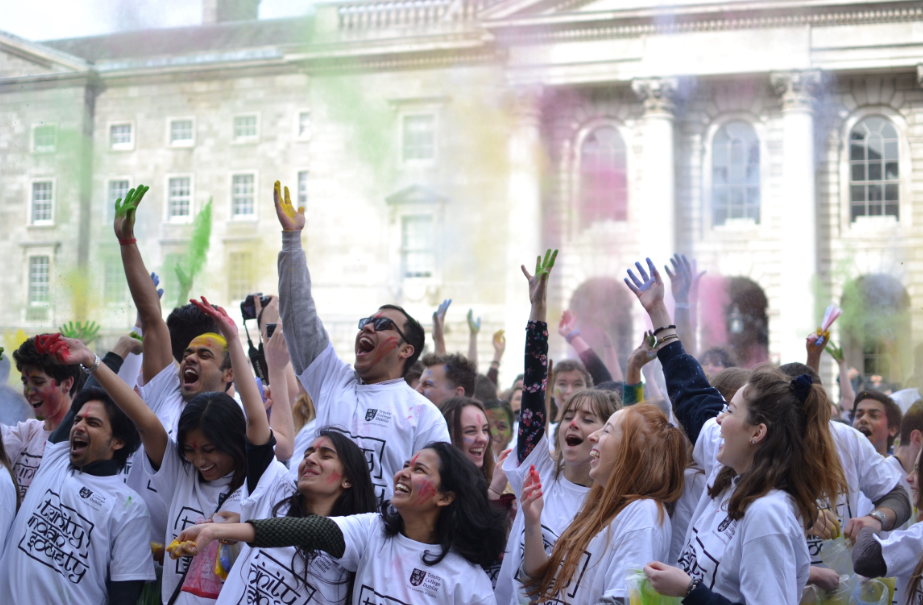In its over 400 years of existence, Trinity has amassed over 120 societies and clubs for its students’ extracurricular interests. These range from large debating societies to the many cultural societies that Trinity has gained over the years as the cultural demographic of its students has evolved. For those weighing up their options, the Student Life website promises that these societies “attract dynamic members from all over the university”. The website assures incoming students that they will find their “niche” and encourages them to “get involved”. Trinity’s Central Societies Committee (CSC) promises countless events and activities to anyone brave enough to venture into the unknown.
“They did not go to events hosted by other societies as they felt that they would be the only person there who didn’t ‘get it’.”
Away from the computer screen, the very real manifestation of all this publicity is Freshers’ Week. One would imagine that no one cultural society can fit a mould of attracting only a specific group of people, but this is exactly the case for the vast majority. Seemingly, human beings crave a sense of belonging. Where better to get that feeling than with people that not only look like you, but also speak the same language as you, and share your heritage? However unique this unifying quality makes each society, it raises the question of whether someone with no connection to the culture would be welcomed.
Speaking to Trinity News, Abdulqadir Abshir, the President of the Afro-Caribbean Society (ACS), explained: “Most people do know about ACS and they do know what we’re about, but in terms of engagement from people of other ethnic backgrounds, the numbers are quite low.” He says that “the ACS does its best to reach out to people that are not directly linked to the African diaspora, and the society as a whole is very welcoming of people from all cultures. But at events it seems like there are only people of the African diaspora in attendance.”
This fear of being the only person of your background in a room full of people who look and talk the same is a common thread in what leads to what Abdul described as a “lack of engagement”. Interviews with students of other cultural societies showed that they knew about their counterparts in Trinity. However, they did not go to events hosted by those societies as they felt that they would be the only person there who didn’t “get it”.
“You wrestle through your initial feelings of ‘maybe I should leave?’, ‘I have no idea what’s going on’ and ‘no one here looks like me’.”
Alternatively, one problem that most people express is that they go to more popular events, such as Holi, hosted by the Indian Society, as it means that they are less likely to feel isolated. Esther Lugemba, a second year Pharmacy student, stated: “I won’t go to an event unless I know at least one person there.” Events like Holi tend to be better advertised and attract a bigger audience so that people can attend with larger groups of friends.
Moreover, first year Pharmacy student Husna Yassin feels that, unless you have studied a particular culture, “[you] might not understand the significance of what is going on”. Holi is one of Trinity’s biggest cultural events of the year, but when interviewing students who went last year, it became clear that most were not aware of the significance of Holi in Hinduism. The technicalities of minority religions are often not talked about in events and social discourse. The fact that most people do not know about its origins unintentionally undermines the importance of this religious festival, although it creates a space for cultural societies to create new traditions. Holi is now celebrated in Trinity every year. As third year History and Politics student, Pitambara Somani, explains: “Festivals is the time when homesickness peaks for many students who come from cultures completely different from the Irish culture. In my country, India, I have grown up celebrating all festivals, whether its Eid, Diwali, Onam, or even Parsi New Year, so it’s indeed strange to be in an environment where if you are a minority, people would usually be indifferent to your culture and religion.”
“Events like Holi tend to attract a bigger audience because they may be better publicised, and that people go in big groups of friends to these events.”
Speaking to Trinity News, Ethnic Minorities Officer, Navika Mehta, gave further insight to this feeling among students: “Trinity has an increasing number of students from minority backgrounds every year. This year itself there has been a 100% increase in non-EU students.” Mehta went on to criticise the lack of relevant facilities to accommodate these new students, highlighting the lack of prayer spaces for Muslim students and the absence of “separate halal or kosher food available in college restaurants and cafes”. Mehta continued to say that “recent events of discrimination has further led to alienation of ethnic minorities from societies”, and believes it is “only fair to say then ethnic minority students will tend to stick with cultural societies, even if it means a lack of integration as a result”.
“There is a beautiful and diverse culture attached to every ethnicity,” Abshir says. “As a society on campus we would like to show what makes Afro-Caribbean culture beautiful and diverse.” Abshir points to the need for greater exposure by Trinity’s various platforms to make diverse events more accessible to all students. Labelling of certain cultural societies like ACS can develop from categorising cultural backgrounds without knowledge of individuals from the background. “That’s the aim and objective of all these societies”, says Abshir. “We’re all trying to reduce the ignorance about our specific cultures, by giving them a means to be exposed to the cultures. We want to show what makes each of our cultures special.”






